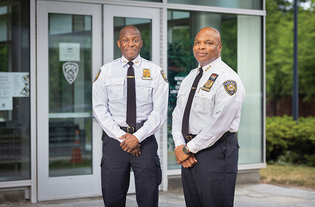
Dan Renzetti
Anthony Campbell ’95, ’09MDiv (left) took over as chief of the Yale Police in July. He succeeds Ronnell Higgins (right), who has been named associate vice president for public safety and community engagement.
View full image
The ad on the side of a New Haven bus was like a literal sign from God for Anthony Campbell ’95, ’09MDiv, who was trying to figure out what to do with his life after Yale. His plan to become a Jesuit priest had fallen apart as soon as he met (and eventually married) Stephanie Clarke ’96 in a Bible study class. His mother was a corrections officer at New York City’s Rikers Island, where his father, who dealt drugs in the Bronx, had spent time as an inmate.
So everything clicked when he saw the picture of a uniformed African American police officer next to a paraphrase of the words of Jesus: “Police others as you would have others police you.” It was a recruitment ad for the New Haven Police Department, which got its money’s worth on that ad buy. Campbell joined the force in 1998, survived being hit by a car by a driver fleeing the police, and eventually served as chief from 2017 to 2019. Now, he’s back at Yale, where after three years as assistant chief of the Yale Police Department, he has succeeded Ronnell Higgins as chief.
Campbell, who took over in July after a long-planned succession, is the first YPD chief who is also a Yale alumnus. He says that having been a student at Yale, a police officer in New Haven, and a member of the New Haven community gives him a unique perspective. “Being able to traverse those worlds and to know the language people speak gives me an advantage and will help me to bridge a lot of gaps.”
Campbell now directs a department that—like many other US police departments—has been in a process of self-examination and reform, both because of the nationwide anger following the murder of George Floyd in 2020 and because of a specific and troubling incident. In 2019, a Yale officer responded to an armed robbery call in Hamden (north of New Haven). The officer fired shots. A Hamden officer who also responded shot and injured a woman. The Yale officer was suspended, then reassigned to an administrative job; the Hamden officer was convicted of assault and sentenced to probation.
The Yale Police had already begun thinking about reform before the incident, which prompted Yale to commission an outside assessment of the YPD. Among the recommendations: better integration of Yale’s public safety divisions, including the YPD, Yale Security, and Emergency Management. To that end, the university created a new position: associate vice president for public safety and community engagement. Higgins, a 25-year YPD veteran and YPD chief since 2011, was appointed to the job.
The new arrangement will aid in adopting a policy of “differential response,” another recommendation from the assessment. Differential response calls for a kind of triage, to determine when armed police officers are needed and when security officers, deans, or mental health providers might be better suited to the task.
Campbell is all in favor of getting police out of situations where their presence may do more harm than good. But he says good policing involves much more than dealing with crime: “Ninety percent of policing deals more with social work—meeting people emotionally, socially, and spiritually where they are—than with law enforcement.” He says his faith and the Divinity School degree that he earned over several years, working at night and taking classes in the day, have helped him in this regard. “Community policing in New Haven has given me an opportunity to minister to those who are crying out at the worst times of their lives.”
 loading
loading